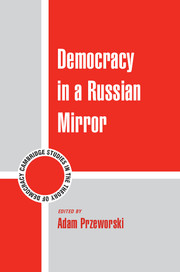Book contents
- Frontmatter
- Contents
- Contributors
- Introduction
- PART I RUSSIA
- PART II DEMOCRACY IN A RUSSIAN MIRROR
- 5 Judging Democracy as Form of Government for Given Territories: Utopia or Apologetics?
- 6 Democracy: Ancient and Modern, Good and Bad
- 7 The Role of Elections in Democracy
- 8 Elections and the Challenge of More Democracy
- 9 Democracy between Elections
- 10 General Settings, Regional and National Factors, and the Concept of Non-Western Democracy
- 11 “Non-Western Democracy” in the West
- PART III PATHS OF POLITICAL CHANGE
- Afterword: Open Issues and Disagreements
- References
- Name Index
- Subject Index
8 - Elections and the Challenge of More Democracy
from PART II - DEMOCRACY IN A RUSSIAN MIRROR
Published online by Cambridge University Press: 05 June 2015
- Frontmatter
- Contents
- Contributors
- Introduction
- PART I RUSSIA
- PART II DEMOCRACY IN A RUSSIAN MIRROR
- 5 Judging Democracy as Form of Government for Given Territories: Utopia or Apologetics?
- 6 Democracy: Ancient and Modern, Good and Bad
- 7 The Role of Elections in Democracy
- 8 Elections and the Challenge of More Democracy
- 9 Democracy between Elections
- 10 General Settings, Regional and National Factors, and the Concept of Non-Western Democracy
- 11 “Non-Western Democracy” in the West
- PART III PATHS OF POLITICAL CHANGE
- Afterword: Open Issues and Disagreements
- References
- Name Index
- Subject Index
Summary
A DEFENSE OF ELECTORAL DEMOCRACY
Willy Brandt, in a parliamentary speech delivered on October 28, 1969, when elected as the first postwar social democratic chancellor of the German Federal Republic, challenged politicians “to dare more democracy” (Mehr Demokratie wagen!). In his view, the problems of democracy could only be solved with more democracy. In the same vein, a few months after a failed coup against the recently reestablished democracy in Spain, the social democratic leader, Felipe González, defended a program of “deepening democracy” (profundización de la democracia). The program was eventually adopted by the congress of the Spanish Socialist Party (PSOE) in November 1981, a few months before winning the elections in 1982 that led to fourteen years of uninterrupted social democratic rule.
Why would these leaders make such statements? How should we interpret that the problems of democracy can be solved by “more democracy”? In both Germany and Spain, these statements were made when the countries were experiencing the first rotation in office since democracy had been reestablished. In both cases, suspicions and fears about this rotation and the future policies of the new incumbents existed. The obvious meaning of the statements is that the influence of citizens in the political process had to be reinforced; that no resistances should prevail over the power of votes. A usual electoral slogan of the PSOE was “your vote is our strength” (tu voto es nuestra fuerza) – implying that other political actors had powerful resources other than the vote. What Brandt and González expressed above all was trust in the voice of the people. Their statements may be seen as rhetorical, innocent, or perhaps dangerous if democracy is seen as a problem rather than as a solution. This is particularly so when democracy is questioned as an effective instrument to achieve substantive outcomes – such as order, welfare, or equality.
- Type
- Chapter
- Information
- Democracy in a Russian Mirror , pp. 147 - 172Publisher: Cambridge University PressPrint publication year: 2015

